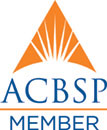
B.S. in Accounting
Add Success to Your Future Through an Accounting Degree
You’ve got a mind for business and a desire to make a difference. Regent’s Bachelor of Science (B.S.) in Accounting degree program equips you with the skills needed to become a crucial member of public, private or nonprofit business sectors. Take coursework in international business, strategic management, law and ethics, operations, and financial management—preparing you to sit for the CPA exam—taught from a Christian perspective.
ALIGN YOURSELF WITH EXCELLENCE
Regent has been ranked among Top National Universities by the U.S. News & World Report for two consecutive years (2019 & 2020). Our programs have also ranked as the #1 Best Online Bachelor’s Programs in Virginia for 8 years in a row. Experience the Regent difference through our ACBSP-accredited B.S. in Accounting degree program.
Learn more about undergraduate student achievement by clicking HERE.
SHARPEN YOUR SKILLS
Learn auditing, tax preparation and laws for personal, corporate, and nonprofit business use.
BUILD ON A STRONG FOUNDATION
Anchor your knowledge and skill on Christian principles and values.
LEARN FROM THE BEST
Be mentored by faculty in Virginia Beach who hold the highest degrees in their field.
On completing the Bachelor of Science in Accounting, you will be able to:
- Sit for the Virginia CPA exam.
- Analyze and prepare comprehensive business reports and financial statements.
- Understand internal systems to produce accurate and reliable accounting data.
- Demonstrate ethical, innovative business processes and investigative skills to deter organizational fraud.
Career Opportunities
- Auditing
- Managerial
- Banking
- Tax Planning
- Investment Analysis
- Financial Forensics
- Information Systems
Provides a comprehensive presentation of financial accounting principles and practices. Emphasis is placed on the preparation of financial statements, the basic framework and contents of these reports, and the preparation process.
Managerial decisions on prices, resource allocation, capital investment, and the functional areas of a business (marketing, production, purchasing, and finance) that work interdependently to achieve profit. Prerequisite: ACCT 205.
Examination of financial accounting concepts, theories and practices to include the following topics: cash and receivables, inventory valuation and credit policy, fixed assets, and revenue and expense recognition. Prerequisite: ACCT 211.
Continuation of Intermediate Accounting I, studies the advance concepts and practices associated with liabilities and stockholders’ equity, earnings per share, income tax allocation, financial statements reporting and financial statement analysis. Prerequisite: ACCT 215.
Examines how accounting information systems function in today’s business environment. The course design emphasizes the internal control features necessary to produce accurate and reliable accounting data as well as the steps necessary to properly record, summarize and report accounting information in both manual and computerized systems. Prerequisite: ACCT 211.
Examines financial auditing and other assurance services performed by accountants. Topics include: auditing standards, legal liability, internal control, sampling theory, auditing procedures for revenues and expenditures, the nature of evidence, and auditing techniques necessary for an independent auditor. Prerequisite: ACCT 211.
An examination of the federal income tax law and its application to individuals. Topics include: an understanding of gross income, deductions, gains and losses, laws and procedures that apply to federal income taxation of individuals and individually taxed business entities. Prerequisite: ACCT 211.
Studies costing, pricing, planning, and motivation. Topics include: cost accumulation, cost allocation, standard costs, product pricing, variance analysis, budgeting, transfer pricing, performance measurements, and short-term decision making. Prerequisite: ACCT 211.
Expanded study of federal tax laws affecting the various corporate entities, partnerships, estates, and trusts. Topics include: an understanding of laws and procedures that apply to federal income taxation of partnerships, S-corporations, and C-corporations, other corporate structures and tax preparation. Prerequisite: ACCT 340.
This capstone course builds on all financial accounting concepts presented throughout the accounting program. In this course students will consider more advanced accounting issues related to business combinations, consolidated financial statements, intercompany transactions, multinational accounting (foreign currency translations and IFRS), accounting for partnerships, SEC reporting and accounting by fiduciaries. Prerequisites: ACCT 225 and Senior standing.
Exploration of principles and activities in the commercial enterprise including topics such as product, price, promotion, place/channel, competition, company, and communication.
Explores the financial function of the commercial enterprise including topics on working capital management, procurement of resources from financial markets, and financial decision making in the firm. Prerequisite: ECON 120 or ECON 260.
Examines the current and emerging legal principles that impact business transactions, topics include contracts, business organizations and structure, sale of goods, commercial paper, personal and real estate property, intellectual property and international business law.
Surveys the opportunities and challenges associated with planning, conducting and implementing international business transactions in the international marketplace. Prerequisite: BUSN 240.
Study of strategy development and deployment in the business enterprise and examines the overarching application of the role of a biblical worldview in the business enterprise. Prerequisites: BUSN 220, BUSN 240, and BUSN 320.
The nature of ethical leadership through a consideration of the ethical foundations of leadership principles evident in the lives of great leaders; the effect of leader’s values and beliefs on decision-making. Cross-listed with MGMT 330.
Admission requirements for the Bachelor of Science in Accounting degree program vary based on the stage you’re at in life. Select a link below to learn how to apply.
- On-Campus Experience (18-23)
- Online Students/Adult Learner (24+)
- Transfer Students
- Early College (Nondegree Program)
- Professional Development (Nondegree Program)
Invest in your calling with this accounting bachelor’s degree.
2019-20 Tuition Rates
| Program Type | Tuition |
|---|---|
On-Campus Student
|
|
Online Student (enrolled in 8-week classes)
|
|
RN to B.S. in Nursing Tuition |
|
Student Fees
Fee | Amount | Description |
Application Fee (On-Campus & Evening/Online Students)
| $50 | One-time fee, nonrefundable |
Enrollment Deposit (On-Campus Students) Enrollment Deposit (Evening/Online Students) | $150
| Fee is deducted from tuition costs |
Graduation Fee(On-Campus & Evening/Online Students) | $60 | One-time fee upon submission of graduation application |
University Services Fee(On-Campus Students) | $700/semester | Contributes to university academic and administrative operations |
Optional Fees
Late Payment | $100/Session | Incurred per session in the event of late tuition payment |
Course Fees | Varies, | Some courses in theater, animation, cinema television or science labs carry an additional fee |
2020-21 Tuition Rates
| Program Type | Tuition |
|---|---|
On-Campus Student
|
|
Online Student (enrolled in 8-week classes)
|
|
RN to B.S. in Nursing Tuition |
|
Student Fees
Fee | Amount | Description |
Application Fee (On-Campus & Evening/Online Students)
| $50 | One-time fee, nonrefundable |
Enrollment Deposit (On-Campus Students) Enrollment Deposit (Evening/Online Students) | $150
| Fee is deducted from tuition costs |
Graduation Fee(On-Campus & Evening/Online Students) | $60 | One-time fee upon submission of graduation application |
University Services Fee(On-Campus Students) | $750/semester | Contributes to university academic and administrative operations |
Optional Fees
Late Payment | $100/Session | Incurred per session in the event of late tuition payment |
Course Fees | Varies, | Some courses in theater, animation, cinema television or science labs carry an additional fee |
Other
For Virginia residents, this degree will prepare you to sit for the Virginia CPA exam, as it is designed to meet the directives of the Virginia Board of Accountancy CPA eligibility requirements.


